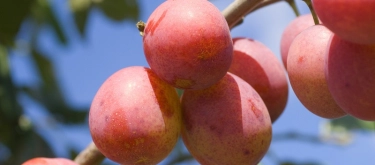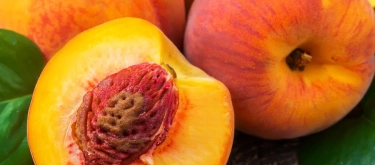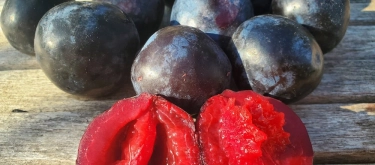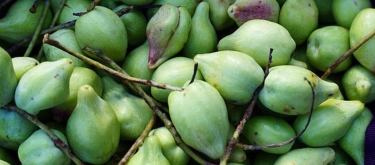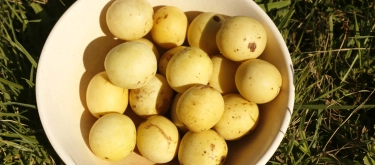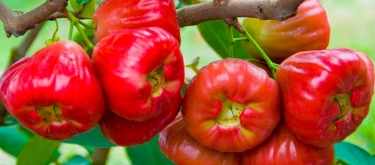Aprium: Taste Profile, Aroma, Benefits and Health Risks
Aprium (Prunus armeniaca × Prunus salicina) is a specialty hybrid fruit developed by crossing apricots and plums, specifically bred to showcase dominant apricot characteristics. Created by horticulturalists to enhance sweetness, texture, and flavor complexity, apriums typically feature around 70–75% apricot genetics, resulting in a fruit with rich apricot-like sweetness accented subtly by plum notes. Originating from the innovative fruit-breeding programs in California, apriums have become widely popular for their unique taste and culinary versatility.
Aprium fruits may trigger allergic reactions in individuals sensitive to stone fruits such as peaches, apricots, plums, or cherries. Their pits contain cyanogenic compounds and must never be consumed. Apriums can safely be enjoyed in moderation by pregnant women.
What does Aprium taste like?
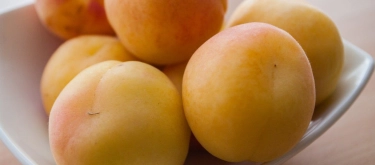
Complete Sensory Description:
Taste
Apriums deliver a predominantly sweet, richly honeyed apricot flavor complemented subtly by the slightly tart, floral undertones typical of plums. The sweetness is intense yet delicately balanced, resulting in an indulgent, dessert-like fruitiness.
Aroma
The fruit has a distinctly fragrant aroma, dominated by apricot's honey-sweet notes and gently accented by faint plum-like floral nuances. Aromatic hints of peach, almond blossoms, and nectar contribute further to its inviting fragrance.
Texture
Aprium fruits possess a soft, velvety skin, enclosing smooth, tender, and notably juicy flesh. The texture is finer, less fibrous than traditional apricots, and exhibits an appealing, melt-in-the-mouth quality reminiscent of ripe peaches or nectarines.
Appearance
Apriums are small to medium-sized fruits (approximately 4–6 cm in diameter) with skin color typically ranging from bright golden-orange to blush pinkish-orange hues, sometimes exhibiting subtle reddish highlights. The inner flesh is vibrantly colored, often deep orange, surrounding a central stone.
In-depth Flavor Analysis:
Aprium’s distinct flavor profile arises from its genetic dominance of apricot traits blended with complementary plum notes, driven by specific chemical and aromatic compositions:
-
Sweetness Profile: High levels of fructose and sucrose deliver pronounced sweetness, exhibiting intense honeyed tones typical of ripe apricots, making apriums notably sweeter than standard apricots or plums.
-
Acidity and Balance: Mild to moderate levels of malic acid introduce gentle tartness, providing essential flavor balance. The acidity is less pronounced compared to plums, subtly highlighting the apricot-derived sweetness rather than competing with it.
-
Aromatic and Floral Compounds: The captivating aroma comes from volatile compounds including ethyl butanoate and gamma-decalactone, imparting fruity, sweet, and peach-like nuances. Terpenes such as linalool and geraniol contribute delicate floral accents, enhancing overall aromatic complexity. Low levels of benzaldehyde add faint almond-like notes typical of stone fruits.
-
Influence of Environmental Factors: Warm climates, particularly Californian growing conditions, enhance the accumulation of sugars and aromatic compounds, intensifying sweetness and fragrance. Proper orchard management and precise harvesting times significantly affect flavor development.
Varieties and Culinary Applications:
Apriums are marketed under various cultivar names, each differing slightly in sweetness and texture. Culinary applications include:
- Fresh Consumption: Enjoyed fresh as a flavorful snack or dessert, often chilled for enhanced sweetness.
- Baking and Desserts: Ideal for pies, cakes, pastries, tarts, cobblers, and puddings, adding distinct apricot-rich sweetness.
- Jams and Preserves: Widely used in preserves, jams, sauces, chutneys, and fruit butters due to their naturally high sugar content and rich flavor.
- Beverages: Incorporated into smoothies, juices, cocktails, and refreshing summer beverages, contributing vibrant sweetness and aroma.
Selection and Storage:
Select apriums that have vibrant coloration, yield gently to touch without excessive softness, and have unblemished skin. Store ripe fruits refrigerated for up to five days. Apriums ripen rapidly at room temperature; therefore, consume promptly upon ripening. Freezing sliced aprium pulp preserves taste effectively for later use in desserts or beverages.
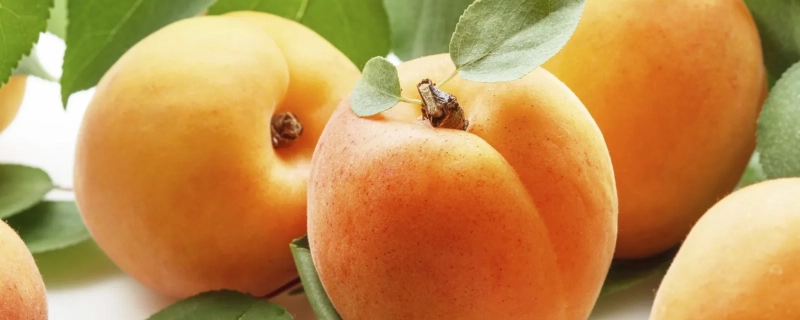
Nutritional Insights:
Apriums provide essential nutrients, including vitamins A, C, and K, dietary fiber, potassium, antioxidants, and phytonutrients. Regular consumption supports digestive health, boosts immune response, and enhances skin health and vision due to vitamin A content. Antioxidants, particularly carotenoids and flavonoids, contribute significantly to reducing inflammation, promoting cardiovascular health, and mitigating oxidative stress, making apriums particularly beneficial for those with chronic inflammatory conditions or nutritional deficiencies.
Expert Insights & Culinary Tips:
- Flavor Pairings: Apriums pair exquisitely with dairy products such as yogurt, mascarpone, cream cheese, and ice cream. Complementary spices include cinnamon, ginger, vanilla, and nutmeg.
- Preparation Recommendations: Allow apriums to fully ripen for optimal flavor and sweetness. Light cooking, such as grilling or roasting, can caramelize sugars, enhancing taste. For fresh eating, chilling fruits beforehand highlights their juiciness and fragrance.
- Pit Management: Always remove and discard aprium pits carefully due to cyanogenic compounds.
Interesting and Curious Facts:
- Aprium was developed specifically to optimize apricot qualities while introducing plum-like enhancements, reflecting innovative breeding efforts aimed at improving stone fruit varieties.
- Despite their similarity, apriums differ notably from pluots by their genetic composition—apriums emphasize apricot genetics, whereas pluots emphasize plum genetics.
- Due to their delicate nature, apriums are predominantly marketed as premium fruits, often featuring prominently in specialty markets and gourmet selections.
Harm and Dietary Considerations:
Apriums are generally safe, yet allergic reactions may occur in individuals sensitive to related stone fruits (plums, apricots, peaches, cherries). Pits contain harmful cyanogenic substances and must not be consumed. Safe for moderate consumption by pregnant and breastfeeding women.
Religious Dietary Considerations:
Apriums have no dietary restrictions within major religious guidelines, including Halal, Kosher, Hindu vegetarianism, and Buddhist dietary practices, making them universally acceptable.
Final Thoughts & Sensory Journey:
Apriums present an enticing sensory experience characterized by luxurious sweetness, gentle tartness, and delicate aromatic complexity. With their remarkable flavor balance and nutritional richness, apriums invite culinary creativity, becoming a cherished delicacy among fruit connoisseurs.
Resources:
- "Temperate and Subtropical Fruit Production" by David Jackson and Norman Looney (CABI, 2011)
- "Handbook of Fruit and Vegetable Flavors" by Y.H. Hui (John Wiley & Sons, 2010)
- "Fruit Breeding" edited by Maria Luisa Badenes and David H. Byrne (Springer, 2012)

